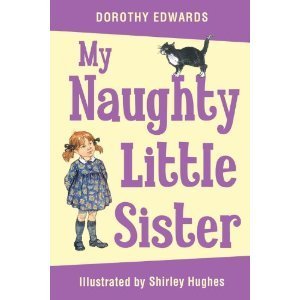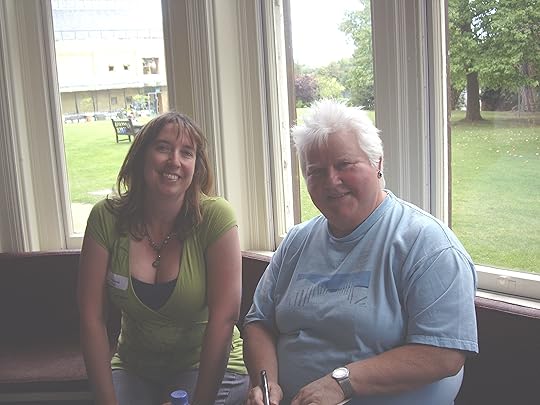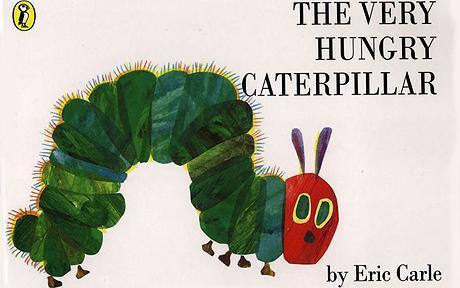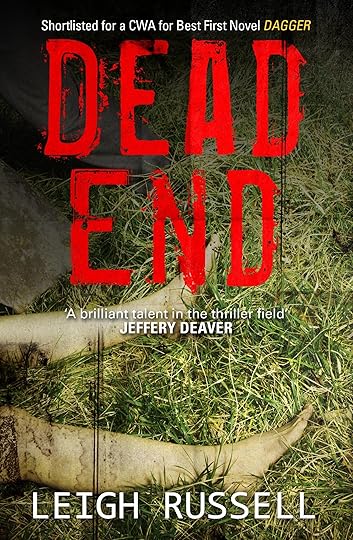Sara Jayne Townsend's Blog, page 46
September 4, 2011
My Life in Books: My Naughty Little Sister
 For the first two and a half years of my life, I was an only child, and then the first of my two younger sisters came along. For quite a long time I resented her existence, because of the inconvenience she imposed on my life. No longer did I have the undivided attention of my parents and grandparents. And I was expected to share my toys.
For the first two and a half years of my life, I was an only child, and then the first of my two younger sisters came along. For quite a long time I resented her existence, because of the inconvenience she imposed on my life. No longer did I have the undivided attention of my parents and grandparents. And I was expected to share my toys.
So when I discovered Dorothy Edwards' "My Naughty Little Sister" books, I identified fully with the long-suffering older sister who narrates the books, telling the exploits of her mischievous little sister and 'Bad Harry' – the little friend down the road. Neither of the sisters have names. The point of view of the older sister is first person, and the younger sister is always referred to as "my naughty little sister". And what trouble this little girl gets into. One story that sticks in my mind is when, at a birthday party, she and Bad Harry get to the trifle that has been specially made for the occasion. After sticking their fingers in the cream for a while, they both get spoons and proceed to eat the whole thing between them. They got very sick, and when I was a child this struck me as a Very Naughty thing to do.
The author claims to have based the stories on the exploits of her own sister in childhood. I was never sure when they were written. When I read them in my childhood, the only thing I remember dating them was mention of coal being delivered into the cellar down the coal chute. By the 1970s, not too many houses were using coal.
I imagine these books will still be enjoyed by children today, especially those with younger siblings. Sibling rivalry has existed since the beginning of time, and small children have always had the capacity to be naughty. Even if your parents try to tell you otherwise.








August 31, 2011
St Hilda's Crime & Mystery Conference 2011
(Cross-posted on the WriteClub blog)
I have a fondness for the crime conference held annually at St Hilda's College in Oxford, as I have mentioned before. Somewhat more academic than other conferences I attend, the St Hilda's Conference always has a theme, with speakers interpreting that theme in various ways and presenting relevant papers. The delegates at St Hilda's are generally highly educated and extremely well read in crime fiction, and are mostly women. I always end up going to bed far later than planned, not wanting to wrench myself away from the conversation.
This year's theme was "The Anatomy of Justice". The talks, as always, were varied and interesting. For the sake of brevity I am going to highlight some of the ones I found particularly stimulating. Cath Staincliffe's talk on Assisted Dying and the Law raised some interesting questions, not least of which was the point that if euthanasia were legal, would the elderly feel obliged to act on this, under pressure from offspring keen to cash in on their inheritance? This is far too deep a topic for me to go into here, but suffice to say Cath has a much more charitable view of human nature than I do.
The conference lecture by coroner Bernard Knight covered 800 years of the coroner in history, and was highly educational, especially for anyone aspiring to write crime. I had no idea coroners had been around for so long.
I also want to mention Penny Evans, lawyer turned writer, who talked about the legalities involved when one is accused of murdering one's spouse. Up until recently, the law stated that if one could prove that the victim was behaving in a way that might cause an otherwise reasonable person to snap, they might be acquitted of murder on the grounds of uncharacteristic behaviour. However, the 'snap' has to be instantaneous. If you stop to pick up a weapon, it becomes far more difficult to prove the 'snap' because time has passed. Hence, with this law it was far easier for men to get away with murder for strangling their wives, than it was for a woman to kill her husband, as most women are not physically strong enough to kill a man with their bare hands. And if she stops to pick up a weapon – well, that suddenly becomes premeditated and is a different story altogether.
The talk certainly offered food for thought, even if it highlighted one more inequality between the sexes, though Penny did seem to imply that the law has now changed to address this.
As always, the Oxford conference included drinks reception and dinner on both Friday and Saturday night, which always offers opportunity to mingle and socialise. For dinner on Saturday night, I found myself at Val McDermid's table. Val is a regular guest at the St Hilda's conference, being an alumni, and the conference is small enough that it becomes much easier to chat to authors than it may be at larger conferences. But still, I admit to having a 'fan girl moment' when I realised I would be sharing her table.
Me with Val McDermid
The book of Val's that I bought (and got her to sign) at the Conference, TRICK OF THE DARK, is set in Oxford and has the protagonist returning to her Oxford college. Val told me it was inspired by St Hilda's. I look forward to reading it, to see if I recognise anything (or even anyone…).
Sadly, the conference was over all too soon and it was time to head back to London and real life. I've been to St Hilda's so often it now feels like visiting an old friend, and I look forward to returning every year.
The date and the theme for next year's conference have already been set. Next year will be looking at humour in crime. I'm already looking forward to it.








August 30, 2011
Latest Guest Blog Post
The dissertation I composed to get my degree in English Literature dealt with the concept that themes in horror change depending on what scares society in general, and the author in particular. I looked at Stephen King (terrified of spiders – as in IT) and Edgar Allan Poe (scared of being buried alive – hence numerous stories dealing with this) for my examples.
Today, though, I am taking a wider view and looking at what has scared us over the decades and how it's been dealt with in horror fiction and films, over on Sonya Clark's blog. Please click here and take a look.
This is a subject I can talk about with enthusiasm for a great length of time, and I am grateful to Sonya for letting me loose on her blog with it.








August 29, 2011
Monday's Friend: Annie Seaton
Today I am pleased to welcome Annie Seaton, who has recently joined the Lyrical Press family, to my blog. Annie would like to start by introducing herself.
I live in Australia, on the beautiful mid north coast of New South Wales. I sit in my writing chair and look out over the tranquil Pacific Ocean. Recently retired from the world of full time work, I am fulfilling my lifelong dream of writing, and currently have one manuscript in pre-publication and two others under consideration. My fourth novel is in development and I am enjoying a foray into the world of romantic suspense in the Caribbean Islands.
I write steampunk, romance and paranormal fiction… and now romantic suspense.
I live with my own hero of many years. Our two children are now grown up and married, and we have two beautiful grandchildren. We share our home with "Bob" the dog and two white cats.
Come and visit me at http://annieseaton.blogspot.com or find me on twitter @annieseaton26 and Annie Seaton on facebook.
The Importance of Branding
By Annie Seaton
The publishing landscape is changing very quickly as we move well into the 21st century.
My first novella is not due for e publication with Lyrical Press until Spring 2012, and I have seized the opportunity in the lead up to publication to create and promote my own "brand". In these days of indie publishing and e- publication, and the availability of books for as little as 99c, it is imperative that an author create a brand with social media.
The new trend of developing personal digital brands through blogs and social media sites, such as Twitter, Facebook and LinkedIn has seen a shift in the types of new authors that publishing companies seek. No longer is the sole requisite for success with a publisher simply a great idea and a well written book, individuals must now bring their own followers with them, whether it be through a social media group such as Twitter of Facebook, or through followers of a personal blog. This can contribute to the success of signing a book deal.
Some tips for creating a brand
• Set up a twitter and facebook account
• Choose your followers carefully eg readers, writers, editors, publishers
• Tweet frequently. Keep your tweets short, personal and interesting. Your readers like to know about you.
• Create a personal blog
• Blog regularly, there is nothing worse than going to a blog that is not current.
• Find your voice in your social networking.
• Comment regularly on other's blogs
• Leave your opinion on third party sites
What are your thoughts on personal branding? Does anyone have any more tips or experiences they would like to share?
Annie's writing corner








August 26, 2011
My Life in Books: The Very Hungry Caterpillar
 I've blogged about this book before, but it deserves to be the first book I talk about in this series because it's the first one I remember reading. I actually discovered it when I was three years old – there was a copy in the library of my nursery school. So initially someone must have read it to me – even I couldn't read at that age.
I've blogged about this book before, but it deserves to be the first book I talk about in this series because it's the first one I remember reading. I actually discovered it when I was three years old – there was a copy in the library of my nursery school. So initially someone must have read it to me – even I couldn't read at that age.
I think we must have borrowed it – repeatedly – from the library. I remember my mother reading it to me, probably on many occasions. It's such a wonderful book for children. The repetitive nature of every page, listing what the caterpillar eats and finishing with "And he was still hungry". My mother used to draw out the word 'still', which made me smile. I liked the hole on each page as the caterpillar eats his way through the book – a hole just the right size for a small finger.
And of course the lesson at the end of the story is a wonderfully positive one. The hungry caterpillar emerges from his cocoon a beautiful butterfly, thus demonstrating that no matter what flaws and insecurities you may possess in childhood, you will find your beauty and place in life when you grow up.
When my nephew was born, this was the first book that I bought for him. Its timeless charm continues to enchant children of today just as well as it did forty years ago.








August 24, 2011
What I Learned From My Editor # 3 – "Stop Burbling"
(Cross-posted on the WriteClub blog)
The two e-books I have on Lyrical's list both went through a rigorous editing process. I tried to take on board what my editor told me. In fact, I find when I write now, my "inner editor" has taken on her voice. "If it doesn't move the plot forward, take it out" is what I hear most frequently.
My amateur sleuth, Shara Summers, has a habit of "burbling". When I am writing about her, I find myself with pages and pages of self-reflection that are really no more than her opinion on things and do nothing to move the plot forward. Or I'm focusing on too much detail. I've talked about this before. if Shari gets out of a car she'll remove the key from the ignition, take her seat belt off, open the door, get out, close the door, lock the door, and so on, when all she really needs to do is get out of the car and the reader will assume the rest.
I'm currently working on Draft 3 of the second Shara Summers book, and when I get to the end of this draft, I hope it will be ready to present to beta readers. As I work on it, I am hearing this voice in my head, and I'm sure it's my editor's. "You don't need all this detail. What's important in this chapter? The six paragraphs you've got before that are slowing the story down. Cut to the action."
It used to be that when I was working on Draft 2 onwards I'd be adding words, feeling the need to pad out the story. My editor has taught me that this isn't necessary.
However, this means that I'm writing much shorter novels. Both SUFFER THE CHILDREN and DEATH SCENE lost over 10,000 words in the editing process, and neither of them were particularly wordy tomes to begin with. The current WIP was less than 60,000 words by the end of Draft 2. At the rate I'm going, it's going to come in at less than 50,000 words when it's finished.
I always thought I was a novel writer. Maybe I'm more a novella writer. Perhaps it's fortuitous that I'm an e-author. There's far more scope for short novels with e-books than with print books.








August 22, 2011
My Life In Books: Introduction
Anyone who knows me, or indeed anyone who's been following this blog for any length of time, will have gained an understanding of how important books are in my life. I can no more imagine my life without books than I can my life without writing, and they have both been present for as long as I can remember.
Even before I could read, I remember being read to. I was browsing the children's section of the library from a very young age, regularly picking out books I liked the look of for my mother to read to me. When I got old enough to understand the words myself, I would follow along.
I have not kept a diligent count of every book I've ever read. But I've begun to think about just how many books there must have been. I rememember being read to every night from about the age of three. Let's take an average of 30 books a year. Before the age of 12 this might be being generous, but for the 20 years I've been commuting into London that's an underestimation – it's probably been more like 50. So I think 30 works as an appropriate average. So, 30 books a year for 38 years equals (gets calculator) … 1,140 books.
A lot of them I don't remember. The ones I do, though, are in my memory because they've affected my life in some way. I've decided to start a new series of posts on this blog dealing with these books. The title of each post will be "My Life In Books" and each post will feature a book that has played some significant role in my life.
As you can imagine, this is likely to be rather a long journey. But it won't all be taken at once. So strap yourselves in, folks. We're going for a ride.








August 17, 2011
The Angst Of The Writer
(Cross-posted on the WriteClub blog)
I was re-reading some of my old short stories the other day. During the 1990s, I had reasonable success in getting some of them published. The small press was booming in the UK in those days, and there were a lot of markets for short horror fiction. Most of them were 'semi pro' magazines – paying half a pence a word if you were lucky, and a free copy of the magazine if you weren't. But still, if you were a horror writer there were a lot of places to submit your work.
A lot of the stories I had published were early works – things I wrote in my late teens and early twenties. Only when I look back in retrospect do I realise how horribly depressing they were.
The thing is, though, I've always used writing as a way of working through my issues. And I guess I've had a lot of issues. Certain themes recurred frequently in my writing: betrayal; loss; loneliness; isolation; a fatalistic outlook that we're all doomed to die miserable and alone. A lot of my early horror is more about psychological despair than a Big Bad – and it almost always ends with someone dying in pain and alone.
There are times when I sink into what feels like a deep dark pit, often for no apparent reason, and I wallow there a while. Sometimes it's days, sometimes it's weeks. During these times I get out of bed and carry on with my life but I often feel like I'm just going through the motions. And I try to avoid blogging at these times, because no one likes a whinger and it's not fair to inflict my misery on everyone else. The thing is, though, these feelings always pass, usually disappearing as quickly as they come. So I just ride it out and listen to Muse very loudly on my MP3 player until I feel like I've crawled out of the pit.
Sometimes I think writing is my salvation, because I've always used it to try and deal with these feelings. My grandmother, disapproving of what I wrote, used to ask me why I couldn't write any "happy" stories. I replied that there was no point. Happy feelings I want to hold onto. It's the feelings of misery and despair I try to exorcise, and that's why they end up in my stories.
The writing has kept me sane. If I didn't have it to help me work through these feelings of despair, I probably would have thrown myself under a bus years ago. On the other hand, if I didn't have these angsty periods I probably wouldn't be a writer, since just about all writers I know also experience these feelings, to a greater or lesser degree.
Is it better to have the angst and be a writer, or be completely sane and not be? That's an impossible question to answer, because I've never known life as anything other than an angsty writer.
On a slightly more positive note, I think I've worked through many of my issues, and that might be why I don't write such depressing short stories anymore. There's still plenty of death and despair in my writing, but my recently-published novels have at least featured some semblance of a happy ending in the sense that the main characters work through their issues and move on. It's one thing to be angsty when you're 18. It's another to still be angsty at 40. There are some lessons about life that should have been learned by the time you enter your fourth decade, and one of them is that there are some things you just have to let go.








August 16, 2011
Monday's Friend: Leigh Russell
I am delighted to be able to welcome best-selling crime writer Leigh Russell to my blog as this week's Monday's Friend.
What A Difference A Keyboard Makes
By Leigh Russell
There has been a lot of discussion about the difference technology has made to readers, with people getting excited about the virtues or drawbacks of ebooks versus print books. I don't have a Kindle myself, although my own books are currently selling faster as ebooks than in print, and my detective, Geraldine Steel, has been number 1 bestselling female detective on Kindle for the past two months.
So what about the difference technology has made to writers? The first draft of my debut novel was completed in six weeks, written longhand and typed up each day. Speed isn't necessarily a good thing, but my debut attracted a publisher two weeks after submission, and went on to be shortlisted for the CWA New Blood Dagger for Best First Novel. Working on a new idea, I've recently typed the first draft of a new novel in just three weeks, by cutting out the handwriting part of the process.
With his phenomenal output, how many novels might Dickens have produced on a keyboard? How long would Proust's masterpiece have been? And what a body of work Shakespeare might have left!
There is another benefit to technology. To begin with I could only edit and revise my writing on hard copy, which involved a lot of printing. There are still quite a few obsolete drafts stacked up under my desk, probably a tree's worth of paper. These days I edit and correct on screen, which is fine as long as I can hold the book in my head. My memory isn't great, so on balance it's probably just as well I write so fast!
What difference has technology has made to you, as reader or writer?
Leigh Russell writes the bestselling Geraldine Steel series of crime thrillers.
You can find details of Leigh's books on http://leighrussell.co.uk
Cut Short (2009)
Road Closed (2010)
Dead End (2011)








August 11, 2011
Riot
I wasn't going to talk about the UK riots. I try to keep politics out of my blog. But it's so occupied my life this week there's nothing else to blog about.
Monday night I was late home, as I went to the Million Monkeys writing session after work. The sense of growing unease was palpable, as the rioting around London became more widespread as the evening wore on, but fortunately my train and the area where I live was unaffected, and I arrived home unscathed about 9pm. I was glued to the TV till 1am that night, watching news footage of the city I know and love burning.
I don't know how old I was when I learned the lesson that taking something that didn't belong to you is stealing, and Stealing Is Wrong, but I'm pretty sure I had a firm understanding of it by the time I started school. I'd also been told that wilfully damaging property was wrong. As for setting fires – well, I guess some people find this fun, but I was always terrified of fire. I'm even terrified of the aftermath of fire. The sight of London burning, and the after images, of smoking gutted buildings that used to be shops I've visited, will be with me for a very long time.
The footage of the looting disheartened me. People were blatantly strolling into wrecked shops and helping themselves to whatever they wanted. Are people no longer learning these inherent lessons of childhood? Or do they just not care? Because there was a third lesson here that was being ignored. Just because everyone else is doing something doesn't make it right, or mean that you have to join in.
At that point, I lost faith in humanity. If we're all behaving this way, then we've learned nothing over thousands of years of evolution and we don't deserve to survive as a species. Let's destroy ourselves now and save the universe further inconvenience.
But then the news of the riot clean up crew began to circulate. Armies of people sporting brooms and plastic bags congregated at the riot sites, organising themselves via the same social networks that the rioters used. They called themselves the Riot Wombles. They picked up rubbish, they scrubbed, they swept, they repaired broken windows. Other volunteers brought them cups of tea, with police riot shields being used as makeshift tea trays. Shelters opened for the people who'd lost their homes in the fires. People donated food and clothes to those who'd lost everything.
Then I read Jen Campbell's blog post here. Reading this inspired in me a shred of hope that perhaps humanity could be redeemed after all.
If you're on Twitter, or Facebook, go look up 'Operation Cup of Tea'. This is such a quintessentially British anti-riot campaign, encouraging people across the land to protest by staying home and drinking tea. Don't go looting; stay home and have a cuppa instead.
Life seems to be getting back to normal now. The British seem to be very good at the art of carrying on, regardless. London was bombed in the Blitz of the second world war. It was hit by terrorism during the IRA campaign, and again by a different terrorist group in 2005. Each time it recovered. The same spirit is prevailing now.











